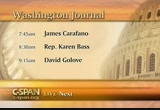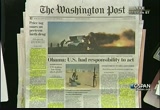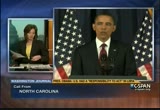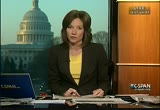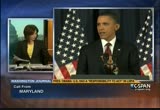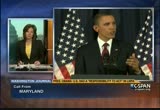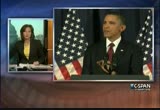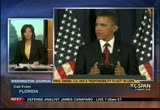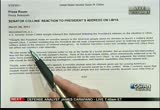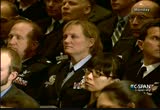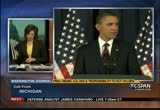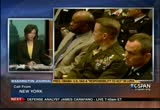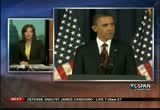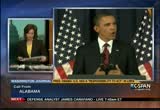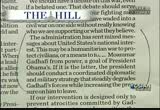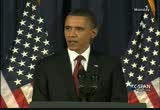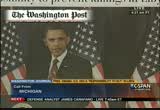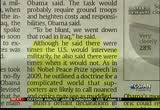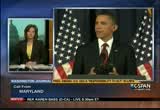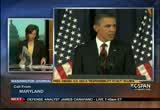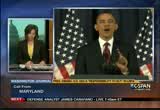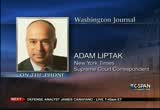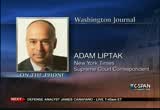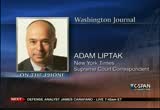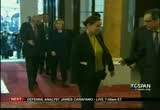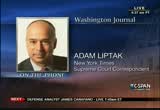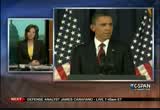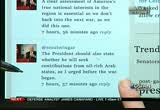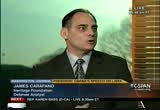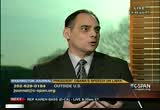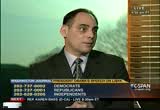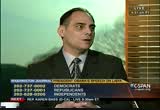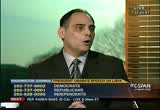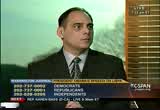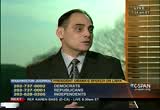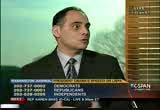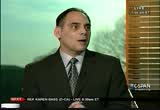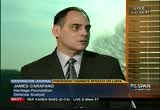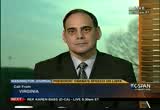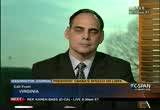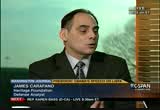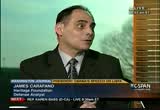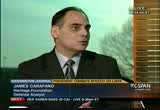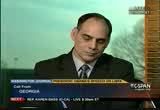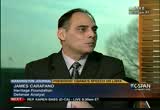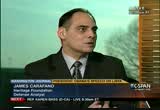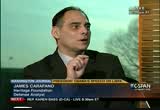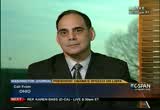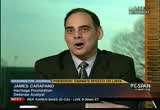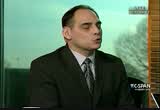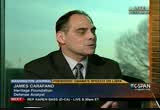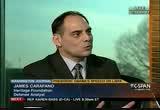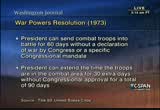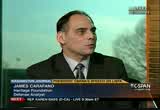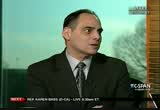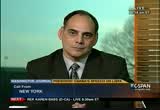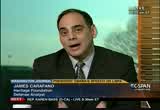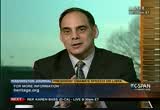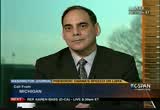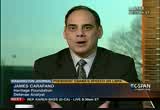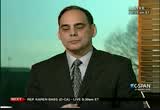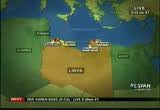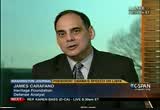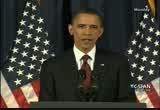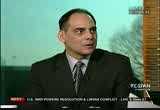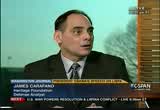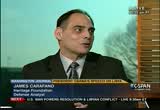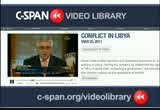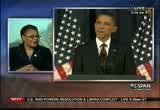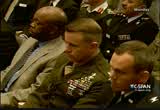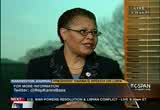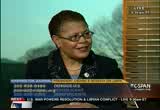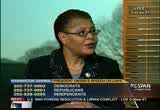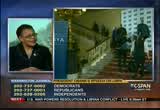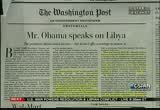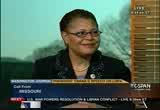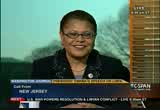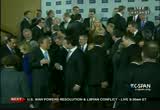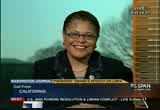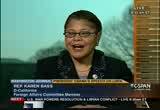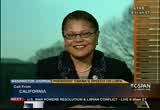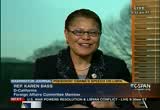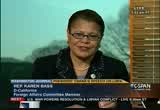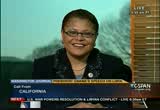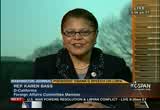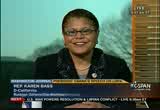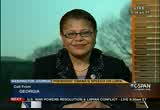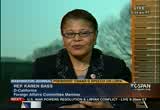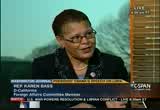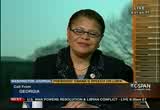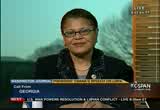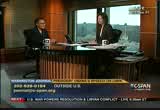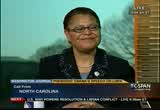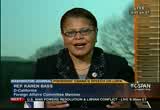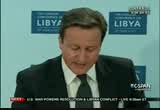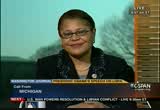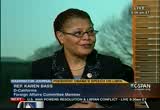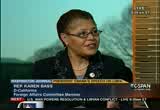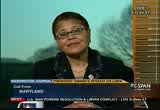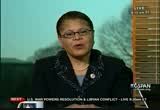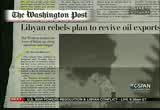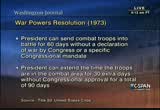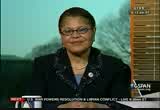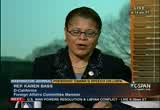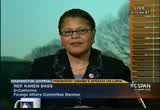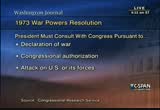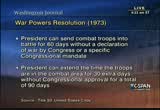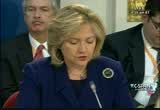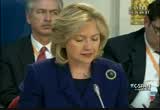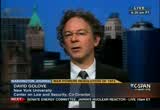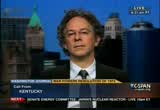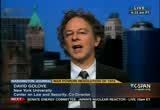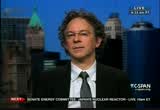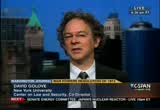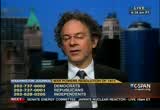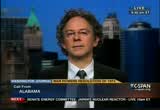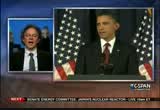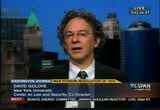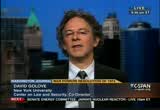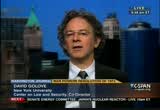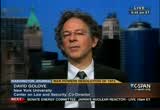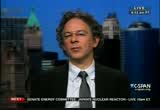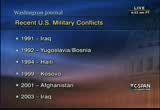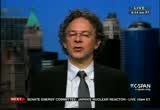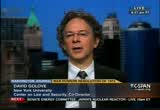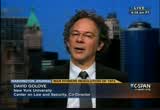tv Washington Journal CSPAN March 29, 2011 7:00am-10:00am EDT
7:00 am
last week president obama informed the congress of his decision to use troops in libya. david golove will discuss the implications of >> it is true that america cannot use our military wherever repression occurs. given the cost and risks of intervention, we must always measure our interests against the need for action. that cannot be an argument for never acting on behalf of what is right. ♪ host: president obama on monday night on a speech that was not from the oval office. president obama addressed the nation from the national defense
7:01 am
university in washington in a speech that lasted 25 minutes in front of a largely military audience that remained quiet for much of the address. the president said that when our interests and values are at stake, we have a responsibility to act. we want to hear from all of you this morning and get your thoughts from the president's speech last night. "the washington post" headline this morning phrases it like that. the president went on to say that even though america's safety was not at risk when it came to libya, we did have to act against colonel gaddafi in libya. here is what he had to say. >> there will be times when our safety is not directly threatened, but our interests and values are. in such cases, we should not be
7:02 am
afraid to act. the burden of action should not be america's alone. as we have in libya, our task is, instead, to mobilize the international community for collective action. host: president obama at the national defense university. what is your take? a lot of responses. it's your turn to weigh in. abc news reported last night that the cost of the libya intervention thus far is $600 million according to the pentagon. here are some more front pages for you on the president's speech and how the different papers are framing this. take a look at the front page of "the new york times." that is "the new york times" this morning. here is the "baltimore sun."
7:03 am
"of the washington times, "deadly advance." also this morning, many of the newspapers have several stories and analysis pieces. we will get to those, as well, but we want to hear from you. a democrat in georgia. what do you think? you are on the air. good morning. caller: good morning. host: what did you think of the speech last night? caller: well, i think he said what he needed to say and he did what we needed to do. the criticism about when he did it and all that -- when somebody like muammar gaddafi says he is
7:04 am
going to go house to house and start murdering people, they needed to act. he had to get all of our people out of their first. there are certain steps he had to take. otherwise, we would have another hostage situation. i think he has been doing the right thing. he has been methodically doing the right thing all along. host: was that your opinion before the president spoke last night? caller: yes, i pretty much knew what he was going to say -- make his point about why he did what he did. i have been following this since it started. i have been watching you. thank you 4 c-span -- thank you for c-span. i have been following this from
7:05 am
the beginning and knew he was taking the right steps. host: did anything in a speech last night surprise you? caller: there was not anything i did not know because of c- span. on the other hand, i think there are a lot of things we do not know and we should not know because there are certain things going on under the wire there that we really do not need to know about. host: we will leave it there. we'll hear from tom, an independent in north carolina. you are next. caller: i appreciate you guys a lot. i agree with her. the president delivered a
7:06 am
wonderful message in terms of making his point and justifying his actions. i want to talk about the cost. i believe you mentioned $600 million. my problem is simply this. we are shutting down government because we cannot cut $100 million. $600 million, come on. second of all, i also heard that this is coming from money that was not in the budget. it just sounds absolutely asinine. the government gets money from the american people. it is coming from tax payers. i want to know where it is coming from and how we can justify spending that type of money. host: let me jump in and let you know that at 8:30 a.m. eastern
7:07 am
time, we will be talking to karen bass. not only does she said on the foreign affairs committee, but she also sits on the budget committee. tom, finish your thoughts. caller: i appreciate that. i will be watching and interestingly waiting to hear what she has to say about that. host: tom mentioned the budget battles that will resurface again as congress returns to washington this week. the current continuing resolution expires on april 8. here is "the washington post."
7:08 am
7:09 am
this morning, we are asking you your take on president obama's speech last night. dennis on the line for democrats, good morning. caller: good morning. thank you for the opportunity and thank you for c-span. first of all, yes, i agree that the president had a responsibility to lead all decent, moral, and courageous countries to stop this mad man from genocide and wiping out his people. old.now, i'm 61 years all my life, i've been -- there in myen a city saying household and my community. it goes something like this.
7:10 am
"the lord is never there when you think you need him, but he is always on time." that obama is the messiah or anything, but he never seems to be rattled by people pulling him to the left or the right. he did not get there soon enough or she got there too fast -- or he got there too fast. america ought to be very grateful to have this young man, this president, at this time. the middle east is exploding with joy and relief that finally the united states, with our allies, nato, and the free world. can you imagine what that
7:11 am
continent would look like? i think a lot of forward-looking people do. can you imagine what that continental would look like once we get a different democracies? they will not all the jeffersonian tight democracies. for god's sake, the pressure. this man is releasing the steam and the pressure and he is walking such a fine line. the man is brilliant. host: we want to hear from a republican. scott in tampa, florida. scott, you have to turn the television down. you are on the air. caller: give me a second. yes. can you hear me now? host: we are listening. caller: i think it is the first right thing that he has done.
7:12 am
spending money on saving lives and dealing with this middle east issue. i also believe we should be in afghanistan. we are on the verge of a serious situation. i think all that is valid. the one thing i do not think is right is these trillions in expenditures in iraq when our economy is hurting so much. i do not see how we can bring ourselves out of that by spending more. i do appreciate what he did here and i think he did the right thing in libya. host: more republicans for you. senator kay bailey hutchison put out this statement last night. "the line must be drawn at america leading the effort to topple a dictatorship.
7:13 am
with the u.s. currently involved in afghanistan, iraq, and providing large-scale humanitarian assistance in japan, it does not diminish." collins of maine said this. "i remain troubled that the president did not seek congressional consent in the absence of a national emergency. libya does not affect our country's vital interest." the president talked about who will lead and when. here is what he had to say. >> this transfer from the united states to nato will take place on wednesday. going forward, the lead in enforcing the no-fly zone and protecting civilians on the ground will transition to our allies and partners. i'm fully confident that our coalition will keep the pressure on gaddafi's remaining forces.
7:14 am
in that effort, the united states will play a supporting role, including intelligence, logistical support, search and rescue assistance, and capabilities to jam regime communications. because of this transition to a broader nato-based coalition, the risk and cost of this operation to our military and to american taxpayers will be reduced significantly. host: james in oklahoma city, an independent. what did you think? ofler: i've never been a fan the whole military industrial complex myself. the president is proving that we can learn from our mistakes, which i'm pleasantly surprised at. i think this is one time that we are doing the right thing, the right method, for the right reasons.
7:15 am
for that, i support him. i'm not real happy that he did not go to congress, but that's pretty typical. we do not follow the constitution. i have to go. i appreciate you keeping me on hold. god bless america. host: you might be interested in the program at 9:50 a.m. eastern time. we will take a look at the constitution and the war powers resolution. new york, a democrat. what do think about the president's speech? he said we have a responsibility to act. caller: thank you for taking my call. i was very moved by this speech. i'm an immigrant from germany. he used a word -- i believe that the germans have struggled mightily with the guild of what
7:16 am
happened in world war ii and i really appreciate going to bat for the libyans freedom. i think it's a terrific thing. host: we'll hear more from the president. he is slated to do a serious of -- to do a series of interviews today. abc said that sawyer's interview will air tonight. the troy, michigan. mark is a republican. you are on the "washington journal." caller: the guy from oklahoma stole a little bit of my thunder about the constitution. i do not think we have a constitutionally declared war since world war ii. as far as the money goes, i know the arab league is behind the
7:17 am
scenes, but what is the actual amount of dollars? we have the technology with the printer drones and all that stuff -- with the predator drones and all that stuff. how much were they backing us financially? they pay off their own citizens so they do not go off into the streets and revolt. i think it's the equivalent of $50,000 per person. it's unbelievable. dictatorships -- we threw off taking in 1776, but we support the biggest kingship. how much are they chipping in? host: henry on the line for democrats. go ahead. caller: i did not listen to the president's speech last night. i was reminded by was secretary gates said, to be cautious about what's going on in libya.
7:18 am
politics supports a vacuum and i think we are creating a vacuum. finally, a foreign policy that involves a lot of wars -- usually a distraction from the very weak domestic policy. i am a democrat. why was the president so apparently weak on a domestic policy? we're spending $9 billion, according to what i heard on your program last week, per month in afghanistan. i'm one confused democrat. host: henry, let me ask you about gaddafi. you think the president should insist that he goes and the united states should take military action? caller: we have a problem at this point. i do not think it's viable to take military action to get rid
7:19 am
of him. it is a problem. we created a major problem. host: senator john mccain, republican of arizona and ranking member of the armed services committee had this to say last night. "if our goal in libya is worth fighting for and i believe it is, then the united states should remain engaged to force gaddafi to leave power." he is then quoted in "the wall street journal." "if i were gaddafi, in my sleep a little bit better tonight." i want to show you what the president said about what it would take to overthrow gaddafi. >> our coalition would splinter. we will likely have to put u.s. troops on the ground to accomplish that mission or risk killing many civilians from the air. the dangers faced by our men and women in uniform would be far
7:20 am
greater. so would the costs and our share of the responsibility for what comes next. to be blunt, we went down that road in iraq. host: elsa, republican in california. your thoughts on president obama's speech. caller: thank you. thank you for taking my call. i was just listening. i'm really kind of disappointed. i did not vote for him, but i was hoping that he was doing better. the united states is hurting, too. our cities are hurting and everybody knows everybody and
7:21 am
all that. in my town, i owe the government $20,000 in taxes. i pulled an ira that i worked for for 20 years. i have to pay them back just because i put it down to buy a house. host: she wants the president to focus more domestically. john, an independent in alabama. what are your thoughts? caller: good morning. host: good morning. caller: i agree with the decision that president obama has made. it is disturbing that all the republicans, regardless of what president obama thus, they are going to disagree. it does not matter what he does. it's not going to be right. i just wish the american people
7:22 am
would come together and put party politics aside and with the benefits of the country as a whole up front. people are talking about the cost of this military action in libya. i do not hear anybody talking aying general electric p e zero amount in taxes this year. they got a $2 billion refund. i do not hear any of the policies complaining about that. i support president obama. he inherited a mess and i think he's doing the best he can with
7:23 am
7:24 am
host: greensboro, north carolina. jerry on the line for democrats, go ahead. caller: good morning. my question for the republicans is, what do they want to see happen? i only hear complaints. i didn't hear anything about what they want to do. if you can get one of the republicans to ensure that. host: you just heard from indiana republican senator lugar say there should be a full debate in congress about the course of action in libya. caller: just like they are doing with the budget, they will do nothing. host: washington, d.c., robert, a republican. what do you think? caller: good morning. i support the president. i do not think he is going far
7:25 am
enough. the biggest question i want to ask and i do not hear any discussion about this publicly -- what would be the effect on the economy if america was forced to withdraw and end wars in iraq, afghanistan and wherever? what would the impact be on the economy. no one is having that discussion. the war is generating employment and it is continuing to have businesses that supply the effort continue. what would the impact be on employment and the whole economy with this reduced demand? what would be the overall effect if the wars were ended? host: you said you do not think the president is doing enough.
7:26 am
president obama talked about the action the united states will take until colonel gaddafi is gone. >> we will deny the regime arms, cut off its supply of cash, assist the opposition, and work with other nations to hasten the day when gaddafi leaves power. it may not happen overnight. a badly weakened gaddafi tries desperately to hang on to power. it should be clear to those around gaddafi and to every libyan that history is not on gaddafi's side. with the time and space we have provided for the libyan people, they will be able to determine their own destiny. that's how it should be. host: house speaker john boehner's spokesman said this.
7:27 am
host: jesse is a democrat in michigan. what do you think? caller: good morning. host: good morning. caller: thank you for c-span. i'm 79 years old. i came from mississippi. when you talk about justice, what about the justice for all the people in their graves because of the klan. why can't they go back to the people to bring those justice? president obama is concerned.
7:28 am
he came to detroit and he thumbed his nose african- american people. i cannot understand why people are hung up on this guy. he's not too much better than bush. you might think, if this were china -- would we be there? host: a little bit about president obama's thinking and analysis in today's papers. "usa today" says this.
7:29 am
7:30 am
did you have a different opinion? caller: good morning. i'm 75 and i have been watching a series of presidents explain military intervention. [inaudible] host: i'm sorry to have to cut you off, but the connection is horrible and impossible to hear you. we will have to go on to david, a democrat in maryland. go ahead. caller: good morning. yes, to this point, been very supportive of the decisions president obama has made. this decision to go into libya -- i thinknt in time we could have done something else. we still have troops in afghanistan and iraq. we need to handle a lot
7:31 am
business -- we need to handle that business before we take military action. i understand muammar gaddafi calling his people rats and all that stuff. that is a civil war. i do not think the united states should get involved. we are not the police of the world. we need to handle our own business. the unemployment rate is still high. this will just add to our deficit. i think we need to pull out of libya, period. we need to handle what we need to handle first. how can we handle somebody else's problems if we cannot handle our own problems? i do not understand that. host: let's hear from tom, a republican in annapolis. you are on the air. caller: good morning.
7:32 am
host: good morning. caller: somebody wanted to know how much the arab league is financing the war in libya. i would like to know how much israel is contributing to the war. i will tell you right now that they will not give us a dime. they will take all our money, but it will not help us when we need it. they continue to expand their very provocative settlements and possibly creating a real confrontation over there. obama is concerned about the humanitarian deals. why did he stop the jews from attacking the palestinians? host: we'll continue talking about president obama's speech monday night from the national defense university. first, the supreme court correspondent from "the new york times" joins us on the phone to talk about a case that the court will be debating today.
7:33 am
i want to show the viewers a headline from "the new york times" yesterday. what is this case? guest: this is the biggest employment discrimination class action ever. it's brought by as many as 1.5 million women who claim that walmart discriminated them in cases of promotion. the court will be looking at -- can these women band together in a single class action? host: the accord will begin looking at this case today. what happens today? guest: the court will hear one hour of arguments starting at 10:00 a.m. we will get the decision by the end of june.
7:34 am
this is of great interest to the business community. they are afraid that a class action this big is the sort of thing they cannot afford to fight, but have to settle. host: what do the democrats say? guest: a lot of democrats are supporters of the civil rights laws, which say the only way to get justice for these women is to not battle this company one by one, but to join together in a class action. they are also a little bit wary of the roberts court, which shows an inclination to be helpful to business interests. host: what are the ramifications for this case? guest: the business community says it would basically in title in the group of women against any large employer to show some statistics, to put together a collection of what the defense
7:35 am
would call antidotes and put companies to enormous risk of paying not multibillion-dollar settlements. host: will the supreme court justices hear today from walmart? guest: walmart's arguments will be -- first of all, our policy is that we do not discriminate. we are a very big company with thousands of stores. maybe bad stuff happens here and there. if that is the case, those individual women are certainly able to sue. they say there's no evidence that 1.5 million women all suffered in exactly the same way. they say that in order for a class action to go forward, these women need to have more in common than the fact that they are women and they work for walmart. need to >point to some specific
7:36 am
policy. host: the women are going to say what in this case? guest: the women are going to say that there's no rule. there's no rule. host: will come back to this. secretary of state hillary clinton is arriving in london. she will be meeting with over 40 foreign ministers to talk about what is next in libya and how the allies come together on this issue of colonel gaddafi. meeting will take place today. we wanted to show our viewers that. the president mentioned in his speech last night that she will be going to this meeting today and that the hope is that the allies will come up with some
7:37 am
sort of approach towards colonel gaddafi. hillary clinton, live coverage, arriving in london today. sorry about that, adam liptak. let's go back to the supreme court. they will be beginning to hear oral arguments in this walmart case. let me have to start over in what the women are arguing. guest: the women say they've come forward with powerful instances of discrimination with statistics that show suspicious gaps in pay and promotion. they say the only way they can get justice is to come together in a single class-action of as many as 1.5 million women and make them trying these suits one by one is againsnot fair to the. host: adam liptak, supreme court correspondent with "the new york times." thank you very much.
7:38 am
we will come back to when we hear more about this case. we will continue taking your phone calls this morning on what the president had to say about libya and his decision to take military action. you just saw secretary of state hillary clinton arriving in london. she is meeting with over 44 ministers, as well as the united nations general counsel and talking to all of them about what should be the strategy for colonel gaddafi. raymond, a democrat in pennsylvania. what is your take? caller: what ever obama does is not enough, but the thing that i think he did was good was the way he took his time and took the exact time to do what he had to do. the republicans were rushing him. those telling him to go to congress -- the president has the right to go to war if he wants to. that is in the constitution.
7:39 am
i do not know why the republicans keep saying to go to congress. if he would have went to congress, look how long it takes for them to do anything. they can never get anything right. they are always arguing. thank you. host: wayne is a republican in biloxi, mississippi. good morning. caller: good morning. all this information that comes from the mass media is brainwashing. i think his speech was weak. he does not write his own speeches. somebody else does that for these puppet presidents. we should not be in the war abrogating -- aggravating other people. host: what did you think was weak? caller: just what i said.
7:40 am
like i said, he does not read the speeches. i do not think throwing bombs at somebody is humanitarian, anyway. i think that is a weak statement. thank you for letting me speak. host: what was your mind said going into the speech last night? did you think the president was coming across as weak even before the speech? caller: i think the president is weak. host: your mind was said before the speech. caller: i already knew what he was going to say. it was basically somebody else's idea for him to say to the american public because this mass media is brainwashing at its finest. it's the agenda to push the world tentacles together. host: do you agree with senator
7:41 am
john mccain that the president needs to be more forceful on the issue of getting rid of colonel gaddafi? i think they need to leave colonel gaddafi alone. there's some sort of other agenda here. this is to put fear into the world. the next move is to biochip everybody. these people will believe this, it is obvious that they are brainwashed. they ought to get their minds right. he does not write his own speeches and neither do any of the presidents. host: the president been labeled what the united states -- the president laid out what the
7:42 am
united states has done. >> we targeted tanks, military assets that had been choking off towns and cities. we cut off much of their source of supply. tonight, i can report that we have stopped gaddafi's deadly advance. host: robert, an independent in california. you are next. what is your take? caller: i think the funding, if we are going to be working with nato, should come from -- i think people should be taxed for using out of country labour and products. there should be no tax for people with 80% american labour and products. host: senator lugar has an
7:43 am
7:44 am
war, they would know what it would look like. the president is elected by all the people. a lot of these people have never been to war and never seen this type of slaughter. you have to do the things that are right. support the president. he did the right thing. if you look at what we did [inaudible] host: we'll have to leave it there. president obama addressed the question of rebuilding libya. here is what e had to say. >> we will safeguard the $33 billion that was frozen from the gaddafi regime so it is available to rebuild libya. the money does not belong to
7:45 am
libya or to us. it belongs to the libyan people and we will make sure they receive it. host: the associated press is reporting this morning that susan rice, u.s. ambassador to the united nations, says there are plenty of non-military means at our disposal. she said this on cbs. senator john mccain said he does not believe it is possible to get rid of gaddafi in the short term through non-military means, such as economic and diplomatic pressure. mccain says that is unacceptable and that we should use any means. we will continue this conversation about libya and the president's speech last night and the reaction from republicans. next, we will talk to james carafano, a defense analyst at the heritage foundation. we will be right back. ♪ ♪
7:46 am
>> in april, we will feature the top winners of this year's c- span student cam competition. watch the winning videos every morning on c-span at 6:50 a.m. eastern just before "washington journal." during the program, meet the students who created them. watch all the videos anytime online at studentcam.org. >> author, poet, and playwright reed.ael he has written over 25 books, including "airing dirty laundry," and "barack obama and the jim crow media."
7:47 am
sunday, april 3 at noon eastern on c-span2. watched previous programs at boktv.org. >> you are watching c-span, bringing new politics and public affairs. every morning, it is "washington journal" about the news of the day, connecting it with elected officials, policymakers, and journalists. weeknights, congressional hearings and policy forums. also, supreme court oral arguments. on the weekends, our signature interview programs. you can also watch our programming any time at c- span.org and it is all searchable adder c-span video library. c-span, washington, your way. the public service created by
7:48 am
america's cable companies. >> "washington journal" continues. host: we are back with james carafano. he is a defense analyst at the heritage foundation. let's begin with what president obama said. he said the united states has a responsibility to act in libya. what is your reaction? guest: the constitution says the president is the commander in chief. certainly, the united states can and has participated in humanitarian operations. every single operation has to be judged on its own merits. the good that you can do and the damage that may be done. there's no rule book in the sense that we must act. it's always a judgment. that's why we elect presidents. that's why we have a commander- in-chief. that's why there is latitude to make those decisions. saying i was forced to do this or required to do this is not accurate. host: what did you make of his arguments that gaddafi would
7:49 am
have made deadly advance is had they waited one more day. guest: that is unknowable. this is often called the rwanda scenario. these things are impossible to prove. there's something called the culminating point. as you advance, you obviously have the advantage. at some point, your lines of communication and your logistics' get very long. the defender, who has fallen back to his own ground, has the advantage. that's called the culminating point. we saw that twice in libya already. when the rebels advanced on gaddafi, as they got closer to tripoli, they became weaker. gaddafi was able to counter attack and push them back. they were falling back in benghazi.
7:50 am
gaddafi was getting overstretched. whether the opposition could have held else without the bombing or through some other types of assistance, that's an open question. the reality is that there is no dew over. these questions are interesting, but they are irrelevant. what the president did in his speech that the administration has not done before it's too late out a path forward and the u.s.'s part in that. he described three things that have to be done. one, isolate and contain gaddafi, so he can eventually be brought to justice. the second task is he has to prevent gaddafi's military from going back on the offensive. that's the second task. that was accomplished with military intervention. the third task is you have to identify and build a credible opposition. by credible, i mean, one that
7:51 am
will not be anti-democratic and one that will not be infiltrated by terrorists. those are the three essential tasks. it was good to hear the president laid that out. there are still unanswered question. nobody doubted the capacity of military operations to stop gaddafi's advance. the question is, where we go from here? the president said we will turn it over to the international community, which i do not think is sufficiently a full answer. host: why not? guest: the international community is ill-defined. we know we have nato. as the president admitted in his speech, in both the nato commitment and the un resolution, those are ambiguous and open-ended documents. the president said he could not go for regime change because a lot of people would see that as
7:52 am
a violation of the un resolution. the nato commitment was clearly structured on the fact that they would not. host: you laid out what you heard from him on principle. on goals, you heard what they are, you're not sure we can achieve them. is that correct? guest: ironically, we do not know much more than when we started. no one ever questioned that if you had a military intervention with airpower that you could stop gaddafi's advance. no one questioned that. the question is, as always, where did you go from here? i think the president articulated the three tasks last night. those were obvious last week before we started the operation. that raises the question, why didn't someone lay that out last week? going forward, the question is -- who is going to do this?
7:53 am
the president did not answer the question. host: secretary of state hillary clinton is in london right now. we just showed her a ride in there. she's meeting with over 40 foreign ministers. what do expect to hear from those meetings? do you expect to hear a strategy on what to do with colonel gaddafi and the answers to your questions that you raised? guest: there may be something in terms of political support. there's a libyan transition of authority that's recognized by some countries. there may be a decision for broader recognition. as the transition of authority has some issues -- most of the leaders are former libyan government officials who are, in a sense, part of the problem. in closed societies, there are two types of people. there are the double figures --
7:54 am
double thinkers and the true believers. i'm not sure we have sorted out who these people are. are these people who will really become democratic and look after the people and ensure human rights? are they just people who switched sides because it is convenient and they want to do what gaddafi did? the international community and the u.s. is going to have to sort through that. this is a sensible course of action. the idea of throwing in more forces and rushed to tripoli -- there are two problems with that. the opposition is not an organized military force. they do not have logistics'. they do not have fire support and artillery. they do not know how to coordinate with the allied air power. even if the allied air power would help them do that and some
7:55 am
would argue that would be a violation of the resolution, do they have the capacity to go to tripoli, and urban center -- as leasing, urban warfare is very different. that would be a battle that would be very difficult to win. you might have the humanitarian catastrophe that they are supposed to prevent. the second problem is, what if they did not win? then you would have a country that is in chaos. no government and no ruler. how do you ensure the capacity that someone will step in and provide the services for the people and look after them? host: what's your analysis of the endgame? guest: and has to be building a legitimate, credible opposition in libya that can look after its own people. and not have infiltration by
7:56 am
terrorist groups. eventually, gaddafi can be brought to justice, whether political or military operation. i'd think that is months and years away. i do not think there's a simple and the game. the question -- who is going to do this? host: when it comes to nato, what sort of experience and assets does nato have versus what the united states does have? guest: how do you keep gaddafi on the offensive for the months or years that it might take to build up a force that can protect the people and bring back the government? that can be very expensive. the no-fly zone that we did in iraq cost several billion dollars. you have to find a cheap way to deter gaddafi. only the united states has long
7:57 am
legs. for example, if you want to fly aircraft without bases, you have to have their roots -- you have to have air refueling tanks. the united states has that. there will always have to be ships at sea to do the embargo part of that. you need command-and-control. there are many things the united states is uniquely suited to provide. i think that's an open question. the president says our military commitments are already going down. quite frankly, they ran out of targets. it's disingenuous to say that we are turning things over. their job is done and there's nothing left to do. it creates this impression that there's a real transition. i doubt that.
7:58 am
even with the operations turned over to nato, i think most military analysts believe he will have to have a significant level of u.s. committee. over the long term, it might transition to something where there are capacities built in the region to do these things cheaper, but i think that's some time off. host: we have a link to abc news. the pentagon is saying right now that in the first week, we spent about $600 million. guest: i'm sure that is true. it could be slightly higher than that. that cost will probably go down over time. as gaddafi's forces lose the ability to do offensive capabilities. if all you're doing is keeping him from going on the offensive, that cost will go down. if you're going to do that for weeks and months and years, that
7:59 am
cost will add up. you have wear and tear on the equipment. if the united states does not do that, someone else will have to do it. who will pay for that? people have to remember that, in many ways -- i'm not being negative. we all want to see gaddafi gone and the people of libya to have freedom. in many ways, this looks very much like the beginning of the first iraq war. we went in with limited force. we had arab support. we had a coalition. we established a no-fly zone. years later, we wound up invading. peopley concerned about who are at the outset of a conflict declaring victory. we have to remember the enemy always gets a vote. host: it was wrong to go into
8:00 am
iraq in 1991 and it was wrong to go into libya? guest: no. complex hardly ever unfold the way people plant. -- conflicts hardly ever and told the way that people plan ned. host: pete, good morning. caller: i like your last point that these things never really worked out the way they are intended. it is definitely disingenuous to say we're in there for humanitarian reasons all the time and then talk about the cost. it seems to me, if you if you care about the human issue, it should not be mentioned. we have to think about the cost when we go into the middle east, anywhere, northern africa, what are we doing -- the money we spend is wasted money.
8:01 am
the humanitarian issue is laughable. let's be honest, we start throwing bombs and missiles around, there are people on the ground that are not involved that we are trying to protect, generally, they get killed also. it seems to me that we need to stop in this country messing around with islam, the muslim world, the middle east, and let it shake out on their work -- on their own. if europe wants to get involved, that is fine. we are wasting our time. host: after the united states, what role do the other countries play? guest: that is not clear. somebody will need to provide a military presence. somebody will need to keep gaddafi's isolated.
8:02 am
somebody is going to have to sort through the opposition to make sure we do not have another pipeline of freedom fighters -- the second largest group of foreign fighters were funneled from libya. we need to be concerned about a pipeline coming the other way to fight gaddafi and whoever else. somebody will need to be on the lookout for that. somebody will need to sort through the transitional government to find people that are interested in promoting freedom and acting responsibly. somebody will need to build the capacity not just to develop the capability to defend themselves, and to look after the people of libya, but eventually to maybe take a government back. that is a long list. >> we talked about what the
8:03 am
allies need to do. the enemy has a vote. what does colonel gaddafi have at his fingertips? guest: i think the biggest advantages are a big bank account. even with frozen assets, people think he has a lot of money. host: more than the 33 billion? guest: that is what people believe. it is often like this with close societies. show me somebody that is absolutely sure, and i will show you some one that does not know what they're talking about. most of these guys are smart enough to have a rainy day fund. subleasing did. -- saddam did. with money, that buys commitment. people are committed to his regime. they might leave -- he might
8:04 am
leave, but they would be stuck there. he has capital. it might be the largest human shield. remember, the idea was to prevent a humanitarian catastrophe. if you're going to have a battle of tripoli, people will die. let's be honest, he has friends. there are people around the world that wants to help him, that have stood up for him. as this drags on, people will find ways to help him. as he gets access to some of the oil, there will be people that want to buy the oil, and that will be revenue to keep him afloat. the idea in the first gulf war was that we isolated saddam, he could not go on forever, and he virtually did. host: cnn reported that libya
8:05 am
rebels blew on his home town. they reported that colonel gaddafi has invested large sums of money in his hometown area and has a lot of loyal supporters. so, it is a story line we will be watching for as people continue to cover the military action. we will go to carlton, ga., christopher is a democrat. we are talking to james carafano of the heritage foundation. caller: i totally disagree with the previous caller. basically, he was saying that the united states should keep their noses in just our business, and let the united world deal with their own issues. we are the leader of the free world. without us, there would not be a free world. all other countries would not have role models or people to buckle up for as far as
8:06 am
independence and freedom. i totally agree with what the president is doing with allowing the international community to come together and figure out a resolution to this problem. we have come -- for we have become bankrupt to do too many wars, and many things we are doing for other countries. we are giving humanitarian aid. we are giving all of these different incentives to different countries, but now we are on the brink of economic downfall. we need other countries to come together, and we all work together to deal with universal issues. guest: the first thing i want to make clear is that regardless of the cost of this war, defense is not bankrupting america. defense is one-fifth of the federal budget, less than that 30 years ago, it was 50% of the federal budget. with all the welfare programs, we spend more than the defense.
8:07 am
we spend much more on medicare, medicaid, and social security. host: you're putting them in the same category -- entitlements against discretionary? guest: defense is not bankrupting the country. foreign aid is a small percentage of the budget. we have financial issues, but they are primarily driven by domestic economic policies, not foreign policy. we need to be clear on that. defending america, and even fighting, these are not the things that are in bankruptcy in the country. the point on humanitarian aid is worth focusing on. if the president said we have stopped the humanitarian disaster that is not necessarily true. if the humanitarian disaster happens next week, next month, or next year, it is just as big of a problem.
8:08 am
no military analyst ivor question that we could make a time out in a civil war. if that does not mean you have stopped a humanitarian disaster. you only do that when you take away the potential. as long as gaddafi is still in power, there is the potential for civil war, the possibility of of of radical insurgent, the crisis is still there. the president should acknowledge that in his speech. in a sense, not to be pejorative, but people reflect back when president bush got on the deck of the uss abraham lincoln, with the banner at "mission accomplished." if the president said our job is basically done here. we do not know if we stopped a humanitarian crisis, and we do not know what international community we will turn it over to. there was much good in the
8:09 am
speech, that he did, after a week of conflict outlined what the plan was, the tasks ahead -- that was good, but he glossed over the vital questions. i think the administration still has a lot of work to do, and the notion that the hard part of american leadership is over -- i do not think that is true. the hardest part is yet to come. it is easy to get people to participate when we are providing military power, but now we want a coalition to stand up and do things that are not in many countries national interest, put a lot of resources into this -- if you can pull that coalition together, get them to stand, and create a libya that is free and at peace, that is an achievement, but it is work yet to be done. host: the associated press is reporting that police in you
8:10 am
gonna have stopped supporters of gaddafi from attacking it u.s. and other embassies in that country. also, u.s. air forces have fired at a libyan vessels. an independentk, in ohio. caller: the gentleman before you started out with a sentence about "this is not within the bounds of the constitution." i find it ironic that every republican seems to pull out the constitution and used piecemeal wording to say we are not within the constitution. the guy did it by the book, unlike george w., who told the whole world lies, and got away with treason. we are spending ourselves into
8:11 am
oblivion with our military. that is claimed history. if you do not believe that, i know somebody that is on this guy's side, and it is the chinese. guest: is great to hear from a fellow independent. i do not have a political affiliation. i never stated that the president was not abiding to the constitution. the question i was asked was there is an obligation to intervene all over the world -- i say that is not in the constitution, and that is an accurate statement. host:, we will be talking about the constitution later in this hour, which the war powers resolution, and the constitution. the constitution has war powers divided.
8:12 am
according to the constitution, which it on your screen is the wars powers resolution. let me show our viewers were power divided. congress has the power to declare war, raise and support armed forces. commander in chief has the authority to repel attacks and lead armed forces. do those two go together, or contradicted? guest: they go together. the design of the constitution was a separation of powers. people need to understand why the war powers authority is in the constitution. if you look at the history of the 17th century, are running up to the american revolution, countries stop declaring war in a formal way. the problem the founding fathers had with that was there was a lack of transparency. governments were taking their people to war, and there was no obligation to explain why, or
8:13 am
what they were supposed to accomplish. the founding fathers thought that was a bad idea. the intent behind the war declaration was that there would be an exchange between the president and the congress, and there would be transparency in terms of describing why we are doing what we are doing. the united states has not declared. -- declared war very often, and we have not since pearl harbor. possibly, with one exception, nobody else has declared war either since world war two. that does not mean that the intent behind the constitution, the transparency is not important. in every conflict, congress has in some way sanctioned the conflict, whether it was through a resolution, or another statement. if congress does not want a
8:14 am
president to fight a war, they can cut off funding. the real issue is has the president -- the founding fathers really intended that the present will act in defense of the country or use military forces, there is transparency, and an explanation to the american people through an exchange with congress explaining why he is doing what he is doing. if there was an attempt in the president's speech to lay that out last night, but you could ask the question why the speech was not given the day before the intervention, instead of one week after? that is a legitimate question. if the president has over a week to negotiate two u.n. resolutions, why was there not a more open exchange with the congress? those are legitimate questions. host: president obama did talk about the decision leading up to
8:15 am
get -- how he went about thinking about it before making the decisions, saying he consulted with congress. when you look at the war powers resolution, the president can send combat troops into the battle for 60 days without a congressional mandate -- the president can't extend the timeline for an extra 30 days without a time correctional approval, for a total of 90 days. if so, he is saying he is living within the resolution, because not only is it limited, but he did consult with congress. guest: past presidents have argued that the war powers act is not constitutional, and having said that, no president has actually challenge that. -- challenged that. of course, there is the question of what will happen because we
8:16 am
are still way out from the 90 days. the president saying he consulted with congress is a bit disingenuous. the president did briefed congressional leaders right before the intervention, and that is similar to what presidents have done in the past where we were going to use military force where it was an emergency or a secret. here, it was a relatively open debate, and i am not sure that it qualifies as consultation. the senate passed a resolution, and the resolution actually endorsed the idea of a u.n. no- fly zone. arguably, that is not authorization either. the u.s. military is not the u.n.. it is very different than saying the u.s. military should do this. what we are doing now is a lot more than a no-fly zone. i am not sure the resolution passes muster.
8:17 am
host: peter in miami emails in. guest: absolutely not. the u.n. authorizes people to act, but does not require people to act. it is voluntary. we could have done nothing in support of the un resolution, and totally been in compliance with u.n. treaty obligations. host: let's go to gregory in new york, democrat line. caller: thank you for having me. hopefully i will be able to finish my point. i want to say one thing, you talk about being disingenuous, i think you are being disingenuous when you represent the heritage foundation without telling america who you are if
8:18 am
they were to go to your home page, they would seek rush limbaugh and sean hannity. the intention is clear. anything the president of united states wants to do, he cannot do in your eyes. secondly, who is on your home page? what two people are on your home page right now as members of this conservative think tank? i wish that c-span would school the american people as to who these people are that sit there and give their point of view. i believe you have your right to give your point of view, but it should be based on facts, the and not bs. rush limbaugh is on your home page. host: we will show viewers the home page. go ahead and respond.
8:19 am
guest: it is a non-profit, non- partisan organization, and it has been around for over 30 years. there is no political affiliation with anyone. thea 25-year veteran of army. i always believe that politics should stop at the nation's end -- edge. if nobody wants to see america fell anywhere. everyone wants nato to be successful. i take issue with the point that somehow these criticisms are intended to throw rocks at the president. the criticism is intended to achieve the results of the american nation, and one thing is important -- is the president wants the support of the american people and the congress, you need an open and transparent discussion about what you are doing with u.s. forces. i did say and i do believe the president said a lot of positive
8:20 am
things in his speech. he told us for the first time what is the scope and the intent of his use of u.s. forces. that was it helpful point. i wish we would have heard a week ago, but it was helpful. he laid out the tasks ahead. if you go to the heritage foundation website and look at the paper we wrote, about the next steps, he outlined the same steps -- have a credible opposition, stopped gaddafi -- isolate him, and set up the conditions to bring him to justice. the points that i am raising now are the questions still yet to be answered. if we need an international committee that actually does this. where is the leadership and the will to get this done, and where are the resources? again, it is not intended to throw rocks at the of administration. it is intended to achieve the best interest of the american people and america's place in the world.
8:21 am
host: we will go to gregg, an independent in flint, mich.. caller: how are you? i had a good point. when obama was first going into office, he was against the war. we all remember that. why, now when there is just a civil war going on, he jumps write on it. i do not understand, and i do not agree. guest: the first thing we recognize is that we elect presidents for an uncertain future. president say this is what i am going to do, and we should recognize that when they get into office, they will deal with the reality they are presented, not the world that exists when they are on the campaign trail. abraham lincoln was determined to avoid the civil war, yet he
8:22 am
found themselves fighting the war for his entire term. i think we have to be able to recognize that presidents get the world they get, not the one they want, and the president is trying to deal with the situation as he finds it the most important thing here -- finds it. the most important thing here is everyone knew the middle east was going to erupt. you cannot have wild demographic growth, no economic freedom, no political freedom, and sustain that model forever it happen to come to a head on his watch. we are seeing a historical event. the world and the middle east will never be the same. libya is a small part. this will go on for years. the president will need to deal with it. this will be something that no matter how long he is in
8:23 am
office, two years or six years, it will be a big deal for him and the united states because this is not over. winston churchill talked about how this is not the city tell -- this is not the beginning of the end, it is just the end of the beginning. host: we will go to vancouver, canada, an independent color, sal -- caller, sal. caller: president obama would be criticized for anything. let's put things into context. gaddafi promised the world more -- killing. he said that it is speech.
8:24 am
john mccain got it right -- 90% of the tripoli is against gadhafi. but his regime falls, he would be history. very few people know how dangerous gadhafi is to the entire world, and taking him out, that should be the least goal. somehow, libyan forces, or an inside job needs to be done. gaddafi killed more people in one week than egypt, tunisia, and other nations during this round revolution. host: sal, where are you from originally? caller: africa, i am naturally ethiopian. guest: presence will always be criticized, no matter what decision they make. you are right. the present will get a lot of
8:25 am
criticism. -- the president will get a lot of criticism. i will say that the criticism i have offered has not been to be little the president, but to come up with the best solution for the u.s. interest and the interests of the libyan people. i have some issue with the march to a tripoli. you might get it right, and gaddafi might trip over a tomahawk, or somebody might assassinate him, but then you would essentially be faced with a country in chaos, and you need to be concerned. that is why i am arguing we need to build the capacity for the people of libya to look after the people of libya. if gadhafi does not collapse, you are right -- many people in tripoli might be against him, but they are innocent civilians, and they will be caught in the crossfire of a war, that could
8:26 am
be a large humanitarian crisis as well. i think we have a moment now -- if you are in a conflict, the best thing is to have the initiative, set the conditions. i think we have a moment now that gadhafi has been put on his heels to set the conditions. we're not reacting, we are anticipating. so, the opposition is making great advances, but they are largely making greater advances because gaddafi's forces are withdrawing. where they are engaged in battle, they are not winning all the time. they probably could not without u.s. military. many people would argue that helping the opposition win a war violates the u.n. resolution, so i think that is
8:27 am
something you would then be sacrificing. that is one problem. the second problem is after the opposition wins, if they do not have the capacity to take care of people, you will have the same humanitarian crisis. host: i want to get your reaction to what president obama said of the impact of the countries surrounding libya. here is what he had to say. >> of massacre would have turf and thousands of additional refugees across libya's borders, putting enormous strains on the peaceful yet fragile transition in egypt and tunisia. the democratic impulses that are donning across the region would be eclipsed by the darkest form of dictatorship, as repressive leaders concluded that violence is the best strategy to cling to power hos. james carafano, what do you
8:28 am
think? guest: he is right. tripoli has a huge population. he could force the population out. that is something that gaddafi has used before. the forced migration of the people -- that is not something that is over yet. again, the problem is will we have the capacity and the will as an international community to stop it until the problem is not there anymore? host: we are talking with a defense analyst for the heritage foundation, james carafano. i want to give you a headline from egypt out of "the financial times." they report this -- mubarak is under house arrest. independent line, charles, go ahead. caller: i listened to the
8:29 am
president's speech, and as a supporter, i was disappointed one thing i am fearful of is that he has probably been coopted by the military industrial conflict -- complex. the path for presidents seems to be they will almost always create their own wars. this may be his own war that he has done in anticipation of election to read the host: test out your at that point, and get your reaction to what the papers are writing. they are saying and obama doctrine is forming. here is "the new york times." mr. obama describes a doctrine that could be broken down to th
8:30 am
host: what do you think, charles? caller: it is true, and i would extend that that it seems to be a policy that we can find a rationale to come after you when we want to. we have the option of deciding we want to do this, and not do that, and that seems to be essentially what we have now. guest: i take the criticism, and i think if you had a disingenuous view of the president you could argue that he has given himself a get out of jail free cards, as he could say it is not my problem if things did not go well. in a sense, it is avoiding the somalia problem where we went in to help, and expand our interests, things did not go well, and we had to withdraw. not only did we need to walk away, but it was clearly our failure. if you think the president sincerely wanted to see the
8:31 am
success of this operation, then he has a lot of work to do, and he cannot just walk away from it. you are not going to have an international coalition without american leadership, involvement, and the engagement. the reality is we will now. we will see how this unfolds in the weeks and months ahead, and we will now is the president will -- know if the present will walk away as soon as things do not go well. host: "the washington post " reports -- guest: that is a problem with u.n. resolutions. it starts great in theory, but
8:32 am
does not work in practice. it was written so broadly it could mean almost anything to anyone. it authorizes a no-fly zone, but basically all measures necessary short of occupying the country to look after civilians. some will interpret that very aggressively, saying if we want to prevent a humanitarian catastrophe, we need to take over the country. some could interpret that very, very narrowly. we knew the russians would interpret that merely because they abstained. host: james carafano with the heritage foundation, thank you for your time. in our last hour, we will take a closer look at the war power resolution of 1973, but coming up next, we will talk to karen bass of the foreign affairs committee and the budget committee. first, an update from c-span radio. >> it is 32 past the hour. more on operations from libya --
8:33 am
international forces are using words and weapons turf military officials say they are flying a u.s. propaganda plane, broadcasting messages and dropping leaflets to government troops on the ground, with the message refuse to obey gaddafi pulled the orders, stop fighting, and go home. with the retirement of robert gates expected by summer, there is word this morning that the obama administration is likely to name the head of the cia to succeed him. he is considered by some to have been done a terrific job, and as laura rosen writes, has mostly kept the cia from being a white house had it. bloomberg is reporting that federal prosecutors are considering whether to pursue manslaughter charges against dp managers for decisions made before the deep water verizon explosion.
8:34 am
-- deep water horizon explosion, investigating statements made by leaders, including former bp had tony hayward. those are the latest headlines on c-span radio. >> every weekend, experience american history on c-span 3, starting saturdays at 8:00 a.m. eastern. here first-person accounts from people who have shaped modern america on oral history. history book shelves each is the best known history riders of the last decade. travel to important battlefields. every weekend, there is college classrooms to visit as professors delve into america's past during "lectures in history." joined curators and historians behind-the-scenes on "american
8:35 am
artifacts." and, oh called the presidency -- "the presidency." get our complete schedules online, and sign up to have them in mailed to you using our c- span2 alert text -- e-mailed to you using our c-span alert. find the latest from security council, and reaction from world leaders, on the c-span the deal library. watch what you want, when you want. "washington journal" continues. host: karen bass joins us to talk about what you heard from the president last night. you were in the room. what did you hear? guest: i heard the president
8:36 am
make his case passionately for why we intervened along with the international community after the u.n. security resolution, after requests, and as he describes it, please from the arab league. host: were you asked to attend the speech? guest: high was asked. -- i was asked. i have been trying to follow the events as closely as possible. host: president obama talked about his decision making. did you agree with that? guest: yes, i did. i was watching events take place, and i heard gaddafi's say that he essentially was going to hunt people down, going door-to- door. i personally was very fearful of what the potential massacre might bring. i thought of the gassing of
8:37 am
people. those were the concerns ahead. after the u.n. security council and after the arab league, which was unusual, because you did not find situations like that before. its goal i want to remind viewers what he had to say last night before he took the action. >> we see reaching forces on the outskirts of the city. we knew -- regime forces on the outskirts of the city. we knew that if we waited one more day, benghazi, the city nearly the size of charlotte, would suffer a massacre that would have reverberated across the region, and stain the conscience of the world. it was not in our national interest to let that happen. i refused to let that happen. so, nine days ago, after
8:38 am
consulting with bipartisan leadership of congress, i authorize military action to stop the killing and in force u.n. security council resolution 1973. host: we heard the president said he consulted congress. do you think he did sufficiently confer with congress? guest: he consulted the leadership and the key ranking members. as a new member of congress, i do not have the personal experience to know how this was handled in the past, but from what i have looked at, people i have talked to, this is not different than what has happened before. what is so challenging here is that it is always challenging to do something and to prevent something from happening, do you know what i mean? we're talking about intervening in libya in the same way we intervene in the economy to prevent the collapse of the economy, to prevent massacres in libya.
8:39 am
it is always hard because if we were successful, it did not happen. host: you write there is a congressional obligation. guest: i look forward to the debates this week, to talking to my colleagues in congress to find out exactly what they would have wanted to see differently, but from my understanding of what is happening in the past, this is no different than what other presidents have done, meaning they consulted the leadership. what i have heard from leader nancy pelosi is that the president has been in regular communication. host: this week, on wednesday, the congressional lawmakers on both sides will be meeting with secretary of state hillary clinton, defense secretary datgates.
8:40 am
what do you want to hear? guest: i will be attending those hearings. you know we were not here last week. we were on recess. to come back and hear more details that cannot necessarily be shared as to what the situation was before we intervened, and also what happens now. there are meetings taking place in london where leaders from many nations are talking about libya post-gaddafi, or leading up to the departure if it finishes up that way. what comes next? i will be interested to hear what happens in those meetings. host: we are showing hillary clinton of lighting -- are riding in london from earlier this morning. -- are arriving in london from earlier this morning, also, hu jintao of china was also a
8:41 am
riding. coming out of this, what do you want to hear specifically on colonel gaddafi, and whether he can stay, or should he have to go? guest: the most important thing i want to hear is the degree of the international support. which would be short term, will the community be there for the long haul? from what the president said, i understand our involvement is limited, and nato has taken over command, including the no- fly zone. what comes next? where will the international community be? there is always a cost. what part of the price tag of the international community to take? h code does colonel gaddafi have to go? guest: he would like to see him go, said the president, but whether that was the goal, he said that was not. he said the goal of the
8:42 am
intervention was to prevent the slaughter of libyans, and essentially allow for the masses that have risen up to have a fair shot at driving him out of the country. in the best of both worlds, the no-fly zone would create the opportunity for libyans to drive gaddafi out. host: "the washington post" says this this morning -- the president is not wrong to try to limit the costs, but it curtails american involvement at the expense of failing to resolve the crisis, which might lead to more dangerous. guest: when of the things the president said in drawing a distinction between this and iraq was that our intervention was for a specific purpose, and prevent slaughter.
8:43 am
my interpretation of what he was saying was that if we went in and said we would stay until gaddafi left, we could be establishing another situation that could be a situation like a rock, but it is the international put the community responsibility. -- international community's responsibility. host: let's get to viewers. net, an independent in st. louis, missouri. caller: good morning. i think there is schizophrenic in washington. one minute we're talking about how to find money to solve the problems, and then the next minute we are all fighting award as if we have no debt problems. we live by the rule of law, not their role of kings. we do not have a dictator. we have a president that shares prop -- power with congress.
8:44 am
the constitution says congress will declare war, and that is after debate. congress represents the people. the president said "we", and i have no idea who he meant. the people have been discarded. we do not take orders from the united nations. the decision had to be debated in congress, which represents the people. host: on that point, should there be debate on the floor of the house and the senate? guest: i think you will find that to be the case. we are having a first hearing this week in the the foreign affairs committee. it is my understanding that many will put forward legislation. i am not sure what that will call for. if it might call for us to get out of libya right away, or it might call for further
8:45 am
intervention. the caller talked about in servant -- spirit sunday in washington. i think that is accurate. the president was criticized for not intervening, and now for intervening. senator john mccain said that although he thought it was good that the president explained, he did not think it should be limited. which way should it be? host: should there be congressional authority over the president's actions? guest: i did not think this president has done anything differently than any other president. he did not declare war. when i read about the war powers resolution and talk to some experts, they said the last time a president had come before congress and asked permission to intervene and declare war was actually in 1942, which is very interesting. in terms of interventions that a
8:46 am
taken place over the last number of years, i do not think president obama has done anything different. again, i do not have the personal experience, but from what i have read and experts that i have talked to, that is what i have heard from my colleagues. host: democrat in new jersey. good morning. caller: good morning. i have one question. if we the people in this country, say 30 or 40 of us when out in the middle of the street and started shooting of a in the air, we would be declared terrorists. that is what the patriot act is all about. now, why are we going over there helping people that we do not know are not terrorists, tried to take over another terrorists job? guest: i think it is an important question for libya and other nations undergoing turmoil
8:47 am
-- who is the opposition? that is one of the things i know they are looking bad in london, and i will be interested to find out more about that. i think he is right in terms of the people went out into the street, but i do not think you would hear a president or a leader from the united states say we will go door-to-door and haunt people down, and smashed the opposition in the way that gaddafi led on. the fear was a terrible slaughter that would take place. that was the reason for the intervention. host: we are showing viewers this conference in london, with all the leaders, the foreign minister leaders, and secretary of state hillary clinton, all lined up there for a photograph. joanne, an independent in michigan.
8:48 am
caller: it is refreshing to see a new face on c-span. as a 20-year watcher, i am so sick of the heritage foundation and the american enterprise. you guys are so buddy-buddy with them, or are you too lazy to get other conservative think tanks in there? there are other ones in the d.c.-area. host: i take issue with that because we do have guests from a wide variety of think tanks, but go ahead with your question or comment. caller: i have to disagree with that because i watch it every time, and when i turn around is american enterprise or heritage foundation. another thing, your new format -- i am not happy with. the advertisements you have between guests is just like watching a commercial television, and over, over, and over again you hear the same
8:49 am
advertisements. it used to be nice to see the guests sit down and get hooked up. it made it more real. host: i will leave it there, because the congresswoman is nice enough to share time this morning. howard, a republican in california. caller: good morning, greta, and rep karen bass i think the woman that just chatting about the negative things on the c-span network needs another cup of coffee, for crying out loud. rep bass you have admitted that you are a newcomer in washington, and you do not have the knowledge, and that is understandable -- host: i said i did not have the personal experience.
8:50 am
[laughter] caller: go ahead, where is your personal experience lacking? guest: what i said is that i have been in congress for a short period of time, so why did not have the personal experience of being here through other interventions, and i look forward to consulting my colleagues to find out what was the back story, what was happening behind the scenes and other interventions? in the meantime, i have consulted experts, and on research. we are fortunate. we have an office called the congressional research service, where you can ask virtually any question, and you will be provided a ton of documents and access to scholars who can answer questions about specific things. caller: thank you for that explanation. let's talk about something you are an expert on, ok?
8:51 am
guest: go right ahead. caller: the california budget -- you knew that was coming. [laughter] guest: i did. caller: it is interesting. i know you have no more responsibility, but you were a powerful leader in sacramento for many, many sessions, and when you left, i could give you the $26 billion budget that we lost, and now the voters of california have created a totally democratic legislature, and it is now a democratic office of the governor. we are having quite a dialogue. i'm thinking you might give me a parallel of what you think is going to happen in california, and what you think is going to happen with the budget in the house of representatives? host: as howard mentioned, "
8:52 am
politic0" did a piece about you. karen bass guided the state of california to a massive budget crisis last year. guest: i appreciate your question. i am not in sacramento, by followup on a daily basis. i feel for my colleagues. we are not completely democratic, because if we were we would not be hassling over the four votes we need to put the measure on the ballot so the people of california can decide whether or not we extend the taxes that we raised during the time that i was speaker. i am concerned that if we do not get those votes, but if it does not go on the ballot, that the cuts will just be beyond belief. i remember in the president's state of the union he talked about how we in the united states needs to out-educate the rest of the world, and i think about how in california we cut
8:53 am
over he $11 billion from k-12 education. if the measure does not go to the ballot, the cuts will be devastating. i do find parallels in washington, and i am hopeful, as i was in california, that the leadership, especially in my house, will calm down, if you will, and put forth a resolution carry to the end of the fiscal year. host: would you agree to another $20 billion in cuts? guest: without knowing what the cuts are, it is hard to say. we have a budget committee meeting tomorrow. i will find out what the details are. host: on a related issue of the
8:54 am
budget, libya, abc news reports that the international military coalition intervention cost to the u.s. taxpayer has reached about $600 million according to figures provided by the pentagon. how was is being paid for? guest: i look forward to hearing that when we have the hearing on thursday, but the costs are devastating. having said that, i do think there is still room to cut in the defense department. i want to look at some of the measures that are being proposed barney frank and ron paul, to look at the bases his internationally, some which we might not need. we have a number of bases and tens of thousands of soldiers in germany. do we need a force that day in that location? i think there is still room for us to look to cut.
8:55 am
host: we will go to michael, in newport beach, california. caller: good morning. the show is so interesting all of the time. i am a democrat. i have always been. i am extremely disappointed in the president. i think he is weak, and i understand he has no experience to be president, but i am curious -- first of all, i do not want to talk about california. we keep talking about education, and we have the worst educational system in the country with the worst teachers, the worst lessons, but i want to know the -- i understand trying to work with everybody, but i think he has just made us weaker in the eyes of the world. i guess we are just sort of the clean-up crew for whenever anybody else wants.
8:56 am
i am curious if congress will demand that the arab nations, the arab coalition that wanted us to do the dirty work is going to pay for this? guest: let me take issue with you. good morning. i'm glad you are with us so early. i do have to take issue with the notion that president obama is weak. i can only imagine what it is like to begin issues. one minute he is we, the next minute he is intervening when he should not. it seems like he is in iraq against a hard place no matter which way he turns. -- in a rock, against a hard place, the matter which way he turns. i think when history is written -- 7 presence try to bring about health reform, and were not able to do it. financial reform, the congress -- the progress in the 11th
8:57 am
congress will be written as a very productive. i need to take issue with the notion that he is a weak president. i do not agree with that at all. when it comes to the budget, cuts, and the economic situation we are in right now, i could only imagines what it would have been like if we had not intervened. let me go back to california. had it not been for the economic stimulus, california would be over a cliff. host: to reset is a republican in atlanta, georgia. caller: i hope you give me the respect you gave the california callers. we do not trust president obama. why did he feel that the american people or congress were not important enough to ask permission to take us to what other war that we cannot afford?
8:58 am
and, to spend millions of dollars -- president bush when before congress to ask to go before -- to war in the iraq. biden is out there saying he would personally and teach -- impeach president bush if he goes to war without going to congress. that is exactly what president obama did. why does he think he is better? why can he make up his own rules and laws, circumvent, and do things the american people would not want? if the past, we probably would have agreed. guest: president obama is the commander in chief of our military. like i said before, he has not done anything different than any other president did. i do not know where you are
8:59 am
talking about when you said president bush came before congress and asked. i do not think so. consulting congress is exactly what president obama did. i keep qualify it by saying i cannot wait to talk to my colleagues who have participated in many other interventions to find out how about consultation went, but he consulted with congressional leadership, key committee leaders. this is no different than one at the -- any other president has done. i will end by reminding you that president obama is the commander in chief. you say we do not trust them. i am not sure who the "we" it is. i think plenty to trust him, and the polls reflect that. hitchcock when you look at the resolution, -- host:, when you look at the resolution --
9:00 am
are you advocating power when you say the president does not have to come to you? guest: this is an interesting debate. i know the best that was on earlier engage in the debate over the war powers resolution. i was speaking to someone who was involved in congress at the time it was written. there is a lot of debate over the war powers resolution and what it means what it says that what the president is suppose to do is consult his congress. there's a lot of debate about what consulting means, and who he needs to consult with. i would just put it in the context of what other presidents have done. i do not believe we have declared war in libya. i think that as one of the key differences. host: atlanta, ga., mike is a democrat. caller: good morning. you brought some interesting points that i wanted to emphasize.
9:01 am
he is the commander in chief. number two, we are in engaged in asymmetric warfare, where there are no demarcation lines, no boundaries -- you are fighting, in the sense, against stateless actors in many cases. i think the situation like this, where you have a totalitarian, or authoritarian regime that that is the main reason behind the intervention in the first place. i would hate to imagine what that would have been like had we not done anything. also, the world has evolved to a point where no single state has all the resources in terms of manpower, technology, natural resources to solve the world's problems. from that standpoint, we have to generate consensus, we have to build coalitions, and we have to
9:02 am
manage things collectively. it is like terrorism. terrorism will never be eliminated. however, the country's working together as coalitions in terms of collective security can get their arms around it to where it is manageable. what kind of message would we have sent if we had not done anything at all? would be another rwanda? what kind of message would that have sent to other totalitarian regimes out there who are subverting their people? guest: exactly, thank you. i think the caller stated it very well. if we were sitting here today post-massacre and the president had intervened after the massacre, everyone would have been up in arms about that. leading up to our intervention, the president was being criticized especially from my colleagues on the other side of the aisle for not doing
9:03 am
anything. when we do intervene, after the u.n. security resolution and after the arab league's request and after there is a coalition of forces, he is still being criticized. i am not sure which way to go after that. n.c. host: independent caller, go ahead caller: i would like to throw out a couple of thoughts if i could. i would like to address the issue of the notion that has been peddled about in the media that all of these upright uprisn the middle east and africa have to do with a spontaneous burst out of facebook and twitter. i find it quite ludicrous to accept such a notion. i'm a former vietnam vet, army intelligence individual. i would like to remind america that intelligence operations in -- and central america is a
9:04 am
superb example, it doesn't involve a story of small pockets -- it doesn't involve starting up small pockets. for 42 years, hosni mubarak has been in power. suddenly, all these millions of people in the streets of africa and the middle east are uprising under on simply because of some internet chat. guest: it is an interesting point. i think the new media has allowed a level of communication that the regime's were able to prevent previously. i happen to have gone to the facebook headquarters a couple of weeks ago by coincidence and i asked them, what happened actually? they talked about how they could see an increase in conversation and an increase in dialogue before tunisia actually
9:05 am
broke out. i would agree with you. i would not say it was because of facebook, but i do think the new media has allowed a level of communication in the moment instantly that we have not seen before. i also think it is generational. you have a generation of young people who are highly educated and went to college who were not able to find jobs and are sophisticated enough to access this new media. i think all of that together along with many other things contributed to what we have seen take place. host: we want to listen into the international conference taking place right now. david cameron, the prime minister, is the house of this. >> this was to draw a line in the desert sand to halt the murders advance of the dubie forces and i think we should be no doubt that that action to save the city of benghazi, averted a massacre, and has at least given freedom a chance in
9:06 am
libya. i think we should be in no doubt about something else as well and that is as we sit here today and as i speak, people mizrata continue to suffer murderous attacks from the regime. there are reports that the city is under attack from land and the say. gaddafi is using snipers to shoot people down and bleed to death in the street. he has cut off food, water, and electricity to start people into submission. he is harassing humanitarian ships trying to get into the port. he continues to be in flagrant breach of the u.n. security council resolution. that is why there has been such widespread -- host: david cameron at the london conference in libya, giving an update on reports coming out of mizrata. they are reporting utter carnage
9:07 am
in that area h. let's go to a republican in michigan, you are on the air. caller: i beg to differ with your opinion of mr. obama insofar as the fact that we, the voters, we are americans, are like the owner of the restaurant. you folks in washington are servants we hire. that work for us. i don't have that reverence for that office of the presidency. as a matter of fact, i agree with our forefathers who really felt that the presidency was kind of a dangerous office and we should just have the congress and the senate and more of a group mentality than the possibility of a dictator. that office is a dangerous
9:08 am
office and we have to be very careful who we put into it. i would like to say that i think it was you and mr. obama running for the presidency, you would be a shoo in because of your vast experience compared to him being a community organizer. guest: first of all, mr. obama was not just a community organizer. i certainly was as well and i think that is a wonderful thing. senator obama was a state senator for a number of years and he was also a u.s. senator. i am not sure what you mean. i would hate to think that we would have a country that did not have a president given the public opinion of congress. i will leave it at that. host: the associated press is
9:09 am
reporting that the cabinet has resigned in syria as the country has seen the worst unrest in decades. the president in syria accepted the cabin's resignation following a meeting today. the resignation is the latest concession by the government aimed at appeasing more than one week of massive protests. what about these other countries besides libya? guest: in the president's speech last night, one reason why he put it -- pointed out the libyan significance, is because it is between tunisia and egypt. we are watching conflict in an entire region. i will be interested to see what comes out of the international conference. i know it is focused on libya, i am sure they are looking at the greater region. host: silver spring, maryland, a democrat line, you are next. caller: i would like to say for all the people out there who are constitutionalists, as we have
9:10 am
heard several times this morning, we have not declared war and any country since 1944. , during world war two. we have been in at least 50 or 20 different complex since then. none of them would have taken place if we were strict constitutionalists. i would like to ask the congress lady a question about this situation in north africa. do you think that this conflict is based on the speculation of oil? while the other countries over there who are oil-producing countries and are not destabilize the oil market which is hurting the american car -- country because gas prices are going up. >> when the president spoke last
9:11 am
night, he said that the main reason why we were interviewing was to prevent the slaughter. he also raised the situation that was not that long ago on the ethnic cleansing is bosnia and how long we actually intervened there. we could have saved lives maybe if the intervention had happened earlier. i have no doubt that any time you have a coalition, you have people who are it participating in that coalition for a variety of reasons. i certainly know that a number of the countries that have joined in this coalition are way more dependent on oil from libya and our country is. i think there is a mix of motives. however, i agree and believe in what the president said yesterday which is the reason for our intervention. thet: there's a story in " washington post."
9:12 am
let's go to david, a republican in georgia. caller: good morning. you seem like a very nice lady. it is a pleasure to talk to you. a couple of comments -- i am looking at the war powers act. it looks pretty clear to me that the president is the commander-in-chief but he is not the one not just to declare war but if he wants to declare war or use troops, use of our forces, this points out that if there is an imminent involvement in hostilities is clearly indicated. i believe the intent of that is
9:13 am
that if we have to get involved in hostilities, if there is an imminent threat of hostilities to this country. it also says that the president shall provide such other information as the congress may request in the fulfilment of its constitutional responsibilities with respect to committing the nation to war and the use of united states armed forces abroad. it seems pretty clear to me in the language in this that he needs a consensus at least from congress. i think he did have time to go get that. he did not use it. regardless, it is not exactly sufficient to say another president did it this way or not. we need to look at the process here and he had time to do it.
9:14 am
i think he knew better. he probably would have gotten a consensus from congress so i think he should have gone to congress for it. guest: i might be mistaken about this but i know that he did consult with the leadership in both houses, both sides of the aisle as well as the key committee leaders. i'm not positive if there was consensus there. the idea that he would have to come before congress and seek consensus before we intervened, if you read the war powers resolution closer, you will see a very clear mixed message in terms of what is required. what is required is consultation with the congress. there have been differences of opinion about and a court case about and the supreme court refused to hear it or what constitutes consultation. many people would argue that
9:15 am
what the president did was what was required under the war powers resolution which is to consult the leadership of congress and that is exactly what he did. host: that is the issue we will be talking about next coming up with a professor of law, to talk about the war powers resolution of 1973. what is says and why it was enacted and the history around and that is coming up next one more call for the congresswoman. we concentrate't on our own nation. instead of everybody else? we are worried about what they are doing. guest: we certainly have very serious domestic issues. i look forward to the day we can spend far less on defense. when you think about the money we spend in iraq or afghanistan, what that would do with our own nation. there is not any part of our life anymore that is just about
9:16 am
one country. we are a global community in every single way. , from the economy to conflicts, etc. the day is long past that we can operate in isolation. i agree with you. i wish we could pay far more attention to the domestic situation. host: congresswoman, thank you for talking to our viewers. coming up next, we'll turn our attention to the war powers resolution of 1973 but first a news update from cspan radio. >> economic news just in from the standard and poor's cases schiller index shows home prices are falling in most major u.s. cities and the average prices in four of them are at their lowest point in 11 years. home values in atlanta, las vegas, detroit, and cleveland are now below january 2000 levels for the only market where prices rose was washington, d.c. home prices gained zero 0.1%.
9:17 am
energy secretary stephen 2 is set to announce that his department is reducing patent license fees and cutting paperwork. it is an effort to make it easier for startup companies to license groundbreaking technologies. the secretary says the goal of america's next top energy in a bitter challenge is to double the number of start up companies coming out of the national laboratories. the program kicks off may 2. officials in japan called the situation they're very grave. after confirming that highly toxic plutonium is seeping from a damaged nuclear power plant. plutonium has been detected in smaller amounts at several spots outside the fukushima power plant in the earthquake tsunami zone. in 45 minutes, a senate committee hears from top government officials and others about the situation in japan and we will have live coverage at 10:00 a.m. eastern on cspan radio. those are some of the latest headlines. >> every weekend, experience
9:18 am
american history on c-span 3 starting saturday at 8:00 a.m. eastern. it is 48 hours a people and events telling the american story. your accounts from people who have shaped modern america on oral history, history bookshelf features the best mystery writers of the past decade and travel to important battles to learn about the figures and events during the 150th anniversary of the civil war. visit college classrooms across the nation as professors delve into the american past during lectures. join curators and historians behind the scenes at museum exhibits and historic sites on american artifacts. the presidency, focusing on american president's policies as told through historic speeches and insights from administration officials and experts. american history tv on c-span 3, all weekend, every weekend. get our schedule online ensign to have them emailed to you.
9:19 am
as protests continued in the middle east and as nato sets to take control of military operations in libya, find the latest from the u.n. security council, administration officials, and reaction of world leaders on the cspan video library, all searchable on your computer any time. what would you want when you want. "washington journal" continues. host: david golub is a law professor at new york university. let's begin with the war powers resolution of 1973. what does it say? guest: the war powers resolution was adopted in the wake of the vietnam war and was a general effort in congress to regain control, constitutional control over the use of force by the u.s. armed forces. in the post-world war two. had increasingly come under
9:20 am
presidential authority. presidents have used force without seeking declarations of war or operation from congress on a number of occasions. congress thought this had led to the catastrophe of the vietnam war. they thought it needed to recoup those powers through the passage of the war powers resolution. i could talk about the details of the resolution if that would be helpful. host: walk us through it. this is really there is a lot of talk about this as the president takes action in libya and criticism of the president for not going to congress and some say not consulting with congress. we will get to that issue later but walk a spero some specifics of this resolution. guest: the idea of the war powers resolution was to try to define those special circumstances in which the constitution permits the president to use force without first obtaining an
9:21 am
authorization or declaration of war by congress. in particular, national labor disease that involves an attack on the united states. they wanted to distinguish that situation where the president has constitutional authority without going to congress a. . all other cases would require some kind of authorization from congress before the president used military force. that was the general idea. the methods that congress used to achieve that purpose turned out to be very problematic and confusing to many people. in some ways, it ended up achieving the opposite of what they intended. the basic idea is that whenever the president introduces armed forces into any kind of situation involving hostilities or imminent hostilities, he is supposed to report that fact to
9:22 am
congress. after that repor is filed with congress, he has only 60 days in which to withdraw the american forces from wherever they are a unless congress gives its authorization to a longer deployment. i think that is the essence of the war powers resolution. it was the effort of congress to say that the president does not have constitutional power to use force without cars being on board except in limited circumstances. if he does act in a way that is not within its constitutional authority, he has only 60 days to withdraw the troops. unless congress gives its authority. host: when you look at the language -- the president must consult with congress pursuant to unless there has been a declaration of war which rests with congress and they have the authority to declare war, that there is a specific congressional authorization for
9:23 am
some type of action for there has been an attack on u.s. or its forces. is that correct? there's at's right difference between consultation and approval the war powers resolution thought to require both. they sought to enjoin the president to consult with congress before he used armed forces or put them into a situation involving imminent hostilities. it also sought to force the president to seek approval from congress. those are two different things. they are related of the war powers resolution was an act to try to require both. host: i want to show our viewers another part of the war powers resolution. the president and send combat troops into battle for 60 days without a declaration of war by congress or a specific congressional mandate and the president can extend that time. is this the language that you
9:24 am
said had the opposite effect of what congress intended? guest: that's exactly right. presidents have interpreted that language in the war powers resolution to effectively authorized them to use force in any circumstance of their choosing at their discretion for 60 days or perhaps 90 days if they extend that additional 30 days. it became a kind of general delegation of all congress' authority of war to the president but limited to 60 days. that is plainly not what congress had in mind. it is quite the opposite. yet, congress adopted the compromised language agreed it was not well thought through. it creates ambiguities that allow presidents and lawyers from time to time to interpret it in this way from what was meant to be a limitation on congressional powers to a general delegation of authority from congress to the president.
9:25 am
maybe that is the status quo right now. presidents interpret the war powers resolution in that way and presumably that's what president obama understands the resolution since he did send troops into libya recently. he may have consulted with congress but he did not seek their advance approval by statute or declaration of war. instead, he presumed that he has at least 60 days authority from congress based on the war powers resolution. that is the sense in which it has turned the resolution on its head host: we will continue to talk about this. we will talk about the war powers resolution of 1973 and we will get to your phone calls on this in a minute. we want to listen into a little bit of secretary of state hillary clinton addressing the international conference in london on libya. >> the coalition military
9:26 am
campaign has made it possible for more help to get through. for example, a con by organized by the world food program was able to reach ben got to this weekend with 18 tons of supplies including food and blankets. a great deal more aid is needed. we have to work quickly and cooperatively to assess and respond. beyond the humanitarian crisis, we know long-term progress in libya will not be accomplished through military means. all of us have to continue to pressure and deepen the isolation of the gaddafi regime. this includes a unified front of political and diplomatic pressure that makes clear to gaddafi that he must go. it sends a strong message of accountability and that sharpens the choice for those around him. it also includes financial pressure through a vigorous enforcement of sanctions authorized under security council resolution 1970 and
9:27 am
1973. host: she continues to address the over 40 foreign ministers at our meeting in london to talk about what is next in libya. c-span.org go to to find out more -- a 02 c-span.org go -- to c-span.org to find out more. our guest is a golub, a professor of law in new york. let's talk a 'the word consultation', what does that mean? guest: there has been controversy since law is passed. -- was passed. sometimes presidents have treated informing congress of the decision they have made or the deployment they have already undertaken as sufficient to meet the requirement of consultation. congress has often objected that that is an insufficient form of consultation and the idea of the
9:28 am
war powers resolution was to try to require the president to come to congress and inform the congress of what it was he intended to do and allow for congress to have input into whether the the decision should be made. it would be involvement in the actual decisions. the word consultation is somewhat open ended and could probably be legitimately interpreted in different ways. in the context of the war powers resolution, there is a question that congress had in mind something more than being informed. nevertheless, some presidents have acted in that way. others have consulted much more broadly with congress or the leadership of congress before undertaking various deployment. host: we will talk about past examples coming up but first, michigan, go ahead. caller: kenyas begun and the
9:29 am
comparisons are contrasts with -- can you speak on the comparisons in panama where mr. bush sent 24,000 troops into panama? what about the consultations he had prior to that? i am not quite old enough to remember that in detail. i remember the announcement we were going in. ?s there any similarities be there? guest: sure, one thing that is important to appreciate is there is the constitution and the war powers resolution. the war powers resolution is a lot. law. it was intended to enforce what congress understood the constitution to maine and to require.
9:30 am
whenever we ask about what authority the president has for some military action that he took, we ask whether it was lawful. we have to ask was a constitutional and was unlawful under the war powers resolution. those are two separate questions. those are two separate bodies of law. president bush largely ignored in 1989 in the panama military action the war powers resolution. in any event, he did not seek prior approval by congress. he never sought any approval by congress for that action. many scholars of you that particular case as one where the president pushed his constitutional authority perhaps beyond would have been allowed under any traditional understanding of presidential authority. he also began the process of interpreting the war powers
9:31 am
resolution has an authorization for him to use force rather than a limitation. host: let's go next to sam, a republican in kentucky, go ahead caller: good morning. i understand that this is a law. does every block have to meet constitutional requirements? have torylaweveryw have to meet constitutional requirements? this would be an act of war on another sovereign nation. the obama administration is calling this a humanitarian mission. the rebels that we are supposedly helping over there, they don't seem to be your typical civilian group of people. they have their own tanks. they have their own airplanes.
9:32 am
where are they getting this ammunition? where they getting this equipment? there is a whole lot going on here that just doesn't pass the smell test. host: any thoughts on that? guest: i think the caller is wondering whether or not the action in libya should be considered a war under the constitution. he clearly thinks it should be. i think he interpreted the language of the obama administration about this being a humanitarian action as being in some way meant to suggest it is not a war. i think he is quite right in understanding the obama administration in that sense. in many instances, past presidents have tried to characterize certain kinds of military actions they have taken as not really qualifying as war for a variety of different reasons. one reason is that it would not
9:33 am
be considered a war in international law. this is a humanitarian operation approved by the united nations security council and it gives it a certain legal status which arguably takes it out of the legal category of war for purposes of international law and an implicit late takes it out of the category of war for purposes of the constitution itself. perhaps that is what the caller is infering. it would not be the first time a president made such an argument. in favor of the use of force. it raises serious questions about how we determine what falls within the category of war. and how far we can avoid ordinary constitutional rules by looking to definitions of war. host: as the supreme court ever
9:34 am
weighed in on this issue? guest: it has been a long time. host: 1 comes to the war powers resolution. guest: the supreme court and the lower courts in general in the united states have stayed clear of these disputes. many cases have been brought challenging the actions of the president in one respect or another under the war powers resolution but they have uniformly been rejected by the court not because the court disagreed or thought the president was complying with the war powers resolution but because they thought it was an inappropriate question to be answered by the judiciary. the supreme court has been content not to hear any of those cases and allow the lower courts to dismiss them all. host: when did this occur?
9:35 am
what was the situation when this challenge was brought up? guest: there have been several challenges. they have challenged a wide range of activities. they have questioned the failure to consult and the press and reporting to congress when u.s. troops are deployed. they question the failure to comply with the 60-day limit on the time. in with -- by which the president has to end the hostilities under the war powers resolution. all cases have been brought over the past 25 years involving all of those issues. the reasoning of the courts and a different cases have been somewhat different, they have largely turned on the same basic idea which is it is for congress itself to enforce the war powers and not the judiciary.
9:36 am
this is a political dispute that belongs in the political branches and be worked out between them. rather than the judiciary. the failure of the judiciary to undertake this has been the source of much commentary in the academic and world constitutional lawyers. many people have argued that unless they are willing to enforce the war powers issue, it is unlikely that president will comply with the war powers resolution and there seems to be some evidence that is true. the courts have not felt that was their appropriate role and have declined to do that. host: explain how something unconstitutional is not already unlawful. guest: that is an excellent point. it is unlawful if it violates the constitution or the statute.
9:37 am
either way, it is unlawful. however, they are two different sources of legal obligations that apply to congress and the president. one can be constitutional but unlawful and can be unconstitutional but perfectly lawful. the statute and the constitution don't have to have the same rules precisely. you have to look to both sources to determine whether or not the president's action is lawful. the president in principle has to comply both with the constitution and with the law. most presidents, perhaps all presidents with the exception of president obama who has not yet stated an opinion on the subject, have believed that the war powers resolution is unconstitutional itself.
9:38 am
they can justify not complying with the resolution in some aspects by claiming it is an unconstitutional law of congress and it intrudes on the executive power. host: on the commander-in-chief? guest: largely on the commander- in-chief. host: let's go to kansas, independent, good morning. caller: that is exactly what i was going to say. the president and congress are equal branches of the government. congress passed the war powers resolution including the 60 and 90 day language and if they had not concluded that, there would have been a clear challenge for the president to say that congress cannot take away the commander-in-chief powers. is that right? guest: i would put the point it differently. president nixon, who was present
9:39 am
at the time the act was adopted, vetoed it. it was passed over his veto. he objected to law on constitutional grounds based on his commander-in-chief powers. -- subsequentse presidents have questioned the core aspects of the resolution. those claims were made even though the 60-day languages there. what i think it's important about the 60-day language is that presidents have found in that language and authorization to use force for 60 days at their discretion which could not be more opposite of what it was congress intended to do. there is language in other sections of the resolution which explicitly says that nothing in the resolution authorizes the president's to undertake the use
9:40 am
of the armed forces in hostilities at all. they explicitly disclaim any interpretation of the language and yet, that has not been a governing interpretation by the executive branch. it has been more of by the office of legal counsel in a number of different opinions they have issued under democratic and republican presidents. host: ponselle, alabama, go ahead caller: i would like to make a statement regarding the constitution. i would like to say that president obama taught constitutional law. when people are angry with him, they often speak that he was just a community organizer. they don't speak about the fact that he taught constitutional law in one of our major universities in this country host: the what is your comment
9:41 am
about the constitution? caller: if we go back to televised events, we will find that former president bush declared war prior to talking to congress. that happened afterwards. i clearly heard president obama say last night that he consulted with congress. i saw senator mccain "on meet the"press sunday that president obama sat down with him and spoke about what was going on and consulted with him. consultation,' i think it occurred in that process. host: we will leave it there. are we nitpicking? guest: perhaps but
9:42 am
constitutional rules are meant to provide bright line standards for it looks like a constitutional role has been complied with and get the rule itself has not been literally complied with. the constitution generally requires literal compliance. mere compliance becomes less and less mere compliance and is viewed as legitimate. the president did consult with important leaders in congress. there were many indications that congress was in support. the senate passed a resolution of support. for a no-fly zone in libya. i don't think the president acted heedless of congressional opinion. in that sense, he complied with something of the spirit of the
9:43 am
war powers resolution. and yet, he undertook the use of force in that area without getting an actual authorization by congress. one part of this is consulting and taking advice and discussing the matter. getting an authorization means getting both houses of congress to pass the same bill and present it to the president for his signature. those are simply two different requirements. to the extent that the war powers resolution and the constitution require an actual approval by congress, that is a different matter than consultation. having said that, i don't think i disagree with the caller. for all practical purposes, the president did consult with congress and congress was essentially indicating its support for the measure. host: let's hear from a republican in maryland. caller: whether we like obama or
9:44 am
not and i am a republican, that doesn't matter, he is our president. that is it. he has the power. he has the final veto vote. the only reason congress is upset is because they did not get to craft a bill and put in all their pork like they do every other bill. host: independent in jacksonville, n.c., what are your thoughts? caller: it was always my understanding that the president was the commander in chief of the armed forces and that he can do with them as he wished up to declaring war on a country or committing an act of war. is this an act of war or can a humanitarian effort be construed as anything no matter what happens?
9:45 am
host: when you look at article two, section two of the constitution it's as commander- in-chief has the authority to repel attacks and lead armed forces. how'd you square that with what our caller was talking about? guest: an earlier caller made a similar point about whether a humanitarian operation should be considered a war and congress needs to give its declaration in respect to this. it is important -- it is an important historical fact that when world war ii was ongoing and the roosevelt administration was beginning the process of developing what would become the united nations charter, the question of whether or not when the united states security council authorized the use of force in order to maintain the
9:46 am
peace or whatever other purpose is within the scope of authority of the united nations, when they did that, with the president have to go back to congress to get a declaration of war before he used troops to enforce the security council's resolution? it was a key position on the roosevelt administration which was supported by the republican party as well and the charter of the united nations was adopted in the senate virtually unanimously. the u.n. operations should not be thought of as war. they should be thought of as a different category in international practice. the creation of the united nations and the system that would be put in place, the operation of the security council with the major powers of the world represented as well as the smaller and medium powers having seats on the security council, that was a sufficient
9:47 am
basis for determining when force should be used on an international global basis. it would be impossible for the security council to be effective if every country, if every executive branch of every country had to go back to their home parliament to get approval in order to maintain the peace. the security council would not be able to maintain the peace. that was the idea that a humanitarian operation or a police action or enforcement action undertaken to per cent to a security council operations should not be viewed as a war under the clause of the constitution. that goes back to world war two and the u.n. charter and the great debate that took place during that time about internationalism and the role of the united states. this is an important historical issue. host: republican in new york, go ahead caller: if another
9:48 am
country were to come to our country and bomb our air force and military, would we consider that an act of war? is it just because the u.n. is involved? guest: the question is why does the u.n. make a difference? from the point of view of the united nations charter which is the treaty the united states entered into with virtually every other country in the world, they have all ratified the charter, very important as the seven powers are given to the united nations security council to maintain international peace and security, to prevent acts of aggression around the world. the security council had legal
9:49 am
authority to enforce and maintain the peace. in international practice, actions that are authorized by the security council are legally, radically different than unilateral attacks by one country on another which are in violation of united nations charter and are considered acts of war. from a legal point of view, there is a world of difference between them. some people may not accept that. some people say that the u.n. being involved is not impressed them. it is clearly recognized in international law as being of overwhelming importance. host: here is another to wait -- t --weet --- guest: that is a difficult question, a complicated question. there are statutes in the united
9:50 am
states but give the president domestic emergency powers in times of declared war. if congress had to -- and literally declared war, the president would have by statute a whole set of additional emergency powers that he could use inside the united states. that has not happened. it is one reason why congress since world war two has not authorized or declared war. these special emergency powers that the president utilizes during times of declared war are not implicated. the special emergency powers were not in force in vietnam and desert storm. caller: thank you for taking my call. what happens in bahrain or saudi arabia where we have many
9:51 am
assets and of something like this would happen and they use their own assets against us? how we position ourselves politically and economically? it would be too expensive to defend ourselves because of our assets being used on us? if that is a know law or constitutional question. guest: i think that is a strategic or military question. host: will go to georgia, republican, in new york. caller: i served in iraq. [unintelligible] everybody complains that since obama got into power, republicans are bashing him.
9:52 am
we spend like three days in libya. we spent a lot of time in iraq and afghanistan and nobody says anything. host: david golub is exploiting the history of the war powers resolution. he is not a credit. itic. does the war powers resolution apply to recent events? guest: those were very large military actions taken by the united states. the war powers resolution applied to them. the president sought an authorization for the use of
9:53 am
military force from congress. congress adopted specific statutes authorizing those military actions. they complied with the requirement of the war powers resolution. it also complied with constitutional requirements based on the power to declare war. those were two major military conflict, the question of whether the president acted constitutionally in instituting them in the first place i think is not a serious constitutional question. both the congress and the president gave their approval before the wars were undertaken. there are different kinds of arguments to be made. one problem with the iraq war is that there was a false pretense for the war. the administration believed that iraq had weapons of mass destruction which turned out not to be true. whether that made the were
9:54 am
unconstitutional, i don't want to comment it depends on whether the administration was -- had made an honest mistake or was being untruthful. host: let's go to abraham, a democrat line, washington. caller: 90 protecting the call and you are giving -- doing a great job. if you are asked to prosecute our actions going into libya, at what point would you say that the president violated anything concerning the war powers resolution or the constitution? what the areas where he did something wrong? host: let me ask you to give one area in particular because we are running out of time. guest: i don't want to say that
9:55 am
the president acted unconstitutionally. i think those are complicated legal questions. the basic point would be that he initiated the use of military force in libya without first obtaining an approval of congress or an authorization. this was not a case where he was acting in self-defense or repelling an attack on the united states. at least under one view of the constitution, a traditional view, he was acting without constitutional authority in doing that. many, many presidents since world war two have acted in similar fashion. president obama is not the first. there are grounds for arguing, based on the developing understanding of what the constitution requires or permits that the president acted constitutionally. certainly, he acted inconsistently with the aims of the war powers resolution and the traditional understanding of the constitution. host: here's another e-mail --
9:56 am
jason, ano independent in can't caller: this. this is a great day. thank you. i would like to thank david for giving us disinformation. we should stand behind our president and stop making us all look like fools. host: since that was a comment, i will go to dick, a republican in ohio. caller: good morning. host: haori up because we are running out of time. caller: i have been a republican for a long time. i am fed up with what i am seeing coming out of the republican party.
9:57 am
i look at my granddaughter's old tv program quick draw mcgraw and the republican party does not stand for me. i like the rhetoric but of barack obama was white and republican, they would be tying yellow ribbons around every of tree in the nation. host: before we let you go, if you look at recent military conflict, 1991 iraq, 1992 yugoslavia desk bosnia, 199480, 1994 cause of of, iraq, afghanistan -- which one represents a similar situation when it comes to the war powers resolution of 1973? guest: i think kosovo in 1999. this is a better case for the
9:58 am
president's authority because the security council had not authorized the use of force. here he has a u.n. security council endorsement as well as nato support. in bosnia, as well was a similar. haiti was similar for each of these cases was somewhat different. haiti was a small week country compared to the situation in libya today. the bosnia situation was complicated from a military point of view. it is difficult to say any of them are precisely the same period in all of those cases, those are reasonably good presidents for what president obama has done. if a prior president has done it and it makes unlawful, that is a point where we have to be careful. otherwise, our constitutional rules will disappear rapidly if every time there's a violation,
9:59 am
the constitution changes. i hope that answers your question. host: put the war powers resolution in context of the united nations and laws set forth by the united nations. guest: i think the war powers resolution is quite ambiguous about how it applies in the context of un security council operations. many scholars of the war powers resolution believe it was meant to require congressional authorization for any action by the president taken to enforce the security council resolution. the language is somewhat ambiguous. host: daid golub, we are out of time but thank you for joining
185 Views
IN COLLECTIONS
CSPAN Television Archive
Television Archive  Television Archive News Search Service
Television Archive News Search Service 
Uploaded by TV Archive on

 Live Music Archive
Live Music Archive Librivox Free Audio
Librivox Free Audio Metropolitan Museum
Metropolitan Museum Cleveland Museum of Art
Cleveland Museum of Art Internet Arcade
Internet Arcade Console Living Room
Console Living Room Books to Borrow
Books to Borrow Open Library
Open Library TV News
TV News Understanding 9/11
Understanding 9/11